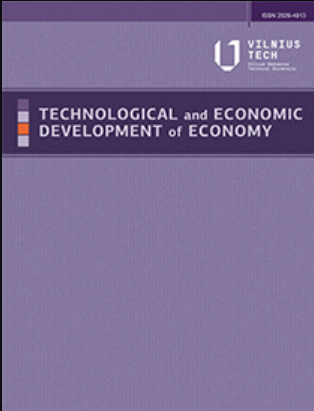集群与创新:波兰集群组织成员与公司技术成熟度之间的关系
IF 3.9
2区 经济学
Q1 ECONOMICS
引用次数: 0
摘要
本文旨在从技术成熟度角度研究集群组织成员与企业绩效之间的关系。本文引入并实现了技术成熟度的新概念,技术成熟度反映了公司在特定领域的竞争力、创新性和市场声誉。为了比较集群组织成员和非成员之间的技术成熟度,创建了一个综合指数。本研究基于理论和实证分析。实证部分是基于从波兰国家智能专业涵盖的技术领域确定的464家公司调查中收集的公司层面数据。采用了一套统计检验来评估(A)集群组织成员和非成员之间的指标是否存在显著差异(b)集群组织成员和非成员之间的综合指数是否存在显著差异。分析结果表明,作为集群组织的成员与公司的技术成熟度之间存在正相关关系。回归分析证明,在控制行业、地理位置和公司规模的情况下,这种关系仍然显著。本文有助于讨论集群组织的作用及其经济影响。本文章由计算机程序翻译,如有差异,请以英文原文为准。
CLUSTERS AND INNOVATION: THE RELATIONSHIP BETWEEN MEMBERSHIP IN CLUSTERS ORGANISATIONS AND TECHNOLOGICAL MATURITY OF COMPANIES IN POLAND
This article aims to investigate the relationship between cluster organisation membership and the performance of companies in terms of their technological maturity. The article introduces and operationalises a new concept of technological maturity which reflects competitiveness, innovativeness, and market reputation of a company in a particular sector. To compare the technological maturity between cluster organisation members and non-members a composite index was created. The study is based on theoretical and empirical analyses. The empirical part is based on firm-level data collected in the survey from 464 companies identified in the technological fields covered by the National Smart Specializations in Poland. A set of statistical tests has been employed to assess whether (a) the indicators differ significantly between cluster organisation members and non-members (b) the composite index differs significantly between cluster organisation members and non-members. Results of the analysis show a positive relationship between being a member of the cluster organisation and the technological maturity of the company. The regression analysis proved that the relationship remains significant when controlling for the industry, geographical location, and size of a company. The article contributes to the discussion about the role of cluster organisations and their economic impact.
求助全文
通过发布文献求助,成功后即可免费获取论文全文。
去求助
来源期刊
CiteScore
10.00
自引率
8.50%
发文量
66
审稿时长
15 weeks
期刊介绍:
Technological and Economic Development of Economy is a refereed journal that publishes original research and review articles and book reviews. The Journal is designed for publishing articles in the following fields of research:
systems for sustainable development,
policy on sustainable development,
legislation on sustainable development,
strategies, approaches and methods for sustainable development,
visions and scenarios for the future,
education for sustainable development,
institutional change and sustainable development,
health care and sustainable development,
alternative economic paradigms for sustainable development,
partnership in the field of sustainable development,
industry and sustainable development,
sustainable development challenges to business and management,
technological changes and sustainable development,
social aspects of sustainability,
economic dimensions of sustainability,
political dimensions of sustainability,
innovations,
life cycle design and assessment,
ethics and sustainability,
sustainable design and material selection,
assessment of environmental impact,
ecology and sustainability,
application case studies,
best practices,
decision making theory,
models of operations research,
theory and practice of operations research,
statistics,
optimization,
simulation.
All papers to be published in Technological and Economic Development of Economy are peer reviewed by two appointed experts. The Journal is published quarterly, in March, June, September and December.

 求助内容:
求助内容: 应助结果提醒方式:
应助结果提醒方式:


